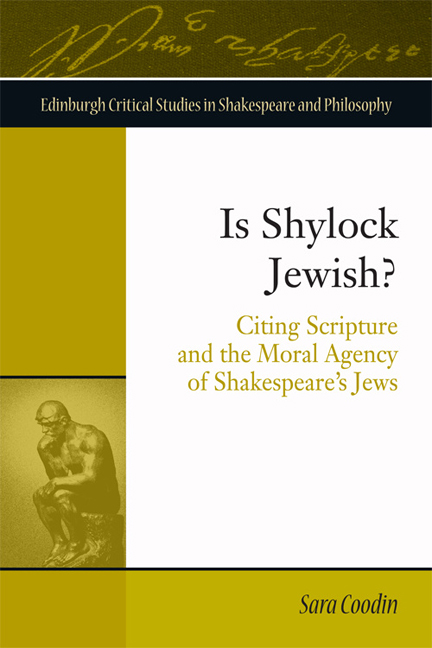Conclusion
Published online by Cambridge University Press: 22 December 2017
Summary
The question that prompts this book – Is Shylock Jewish? – asserts that Jewishness represents a vital and suffi cient category of inquiry into Shakespeare's ‘Jewish play’. In prototypically Jewish form, the book answers that question with another question: What does it mean to be Jewish? Although I have not attempted to argue for a singular model of Jewish culture or identity in the preceding pages, I have outlined a series of hermeneutic strategies that identify particular modes of reading as recognisably Judaic, evoking a distinctive orientation to practical moral questions. By considering the question of what constitutes a Jewish reading of a shared set of biblical stories, I have discussed how midrashic reading strategies constitute a tradition that has remained both conventional and responsive over time. The tradition's responsiveness arises from instances such as the one that Shakespeare scripts into his play, in which Shylock endeavours to find new meaning in a familiar biblical parable.
Such efforts to locate new or alternative meanings are not always given a warm reception. The Merchant of Venice models a particularly painful example in which Antonio disparages Shylock's biblical gloss and impugns his fitness to proffer it, labelling him a ‘devil’ who ‘cite[s] Scripture for his purpose’. Unfortunately, a great many critics within the last century have followed Antonio's lead, describing Shakespeare's fictional Jewish moneylender as a mere placeholder, or foil, within an overarching Christian play.
We should be deeply troubled by the exclusionary implications of Antonio's response as well as the scholarly reluctance to unpack it more critically. We should likewise resist the temptation to see the play exclusively through Antonio's eyes when Shylock makes his own point-of-view eminently readable to us as well. Seeing exclusively through Antonio's eyes closes the door on discussions of Shylock's and Jessica's moral agency and discourages seeing Jewishness as anything more than a series of anti-Semitic stereotypes. Aligning our vision with Antonio's pre-emptively excludes the fuller subjective, first-personal, and ethical dimensionality of Jewish identity and lived experience.
- Type
- Chapter
- Information
- Is Shylock Jewish?Citing Scripture and the Moral Agency of Shakespeare's Jews, pp. 245 - 248Publisher: Edinburgh University PressPrint publication year: 2017

